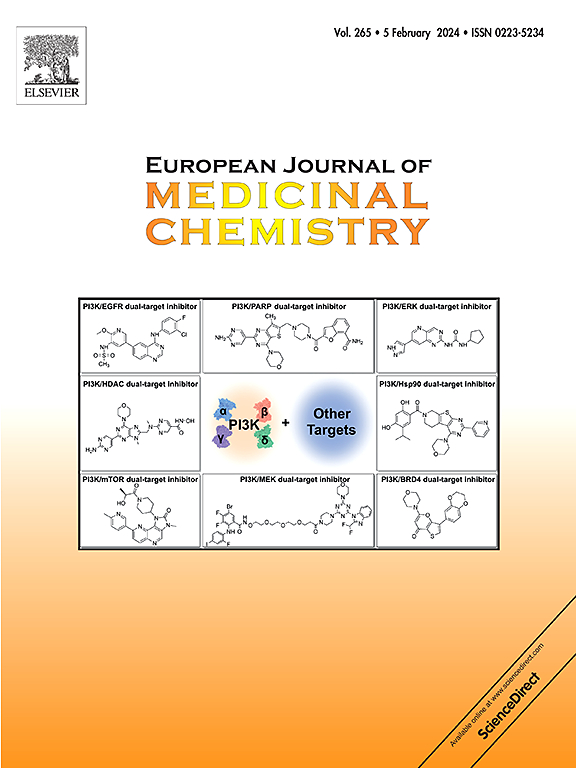氨基酸修饰查尔酮衍生物体外和体内抗结肠癌疗效的研究
IF 6
2区 医学
Q1 CHEMISTRY, MEDICINAL
引用次数: 0
摘要
研究了一系列新的查尔酮衍生物,对结肠癌具有较强的抗癌活性。NCI在其60个细胞系面板上评估了16种以氨基酸为基础的化合物,包括苯丙氨酸或色氨酸以改善水溶性。其中11种表现出显著的生长抑制作用,其中5种表现出高活性,特别是对HCT116结肠癌细胞系,对WI-38成纤维细胞没有明显的毒性。选择化合物5f和5g进行进一步评价;两者均诱导SubG0-G1细胞周期阻滞、继发性坏死以及caspase-3、p53和Bax/Bcl-2的上调。对340种人类激酶的Kinome抑制分析显示,这些化合物可能具有PKC抑制剂的作用,这使它们成为报道的第一个具有这种活性的查尔酮。在体内,这两种化合物都能显著降低肿瘤生长,其疗效与阿霉素相当。这些结果突出了这些化合物作为抗癌药物,特别是结肠癌治疗的有希望的候选者。本文章由计算机程序翻译,如有差异,请以英文原文为准。


Amino acid–modified chalcone derivatives with in vitro and in vivo efficacy against colon cancer
A novel series of chalcone derivatives was developed with potent anticancer activity against colon cancer. Sixteen amino acid–based compounds, incorporating phenylalanine or tryptophan to improve aqueous solubility, were evaluated by the NCI on its 60-cell line panel. Eleven showed notable growth inhibition potencies, with five exhibiting high activity, particularly against the HCT116 colon cancer cell line, and no significant toxicity on WI-38 fibroblasts. Compounds 5f and 5g were selected for further evaluation; both induced SubG0-G1 cell cycle arrest, secondary necrosis, and upregulation of caspase-3, p53, and Bax/Bcl-2. Kinome inhibition profiling across 340 human kinases revealed that these compounds may act as PKC inhibitors, making them the first chalcones reported with such activity. In vivo, both compounds significantly reduced tumor growth, with efficacy comparable to doxorubicin. These results highlight these compounds as promising candidates for further development as anticancer agents, particularly for colon cancer treatment.
求助全文
通过发布文献求助,成功后即可免费获取论文全文。
去求助
来源期刊
CiteScore
11.70
自引率
9.00%
发文量
863
审稿时长
29 days
期刊介绍:
The European Journal of Medicinal Chemistry is a global journal that publishes studies on all aspects of medicinal chemistry. It provides a medium for publication of original papers and also welcomes critical review papers.
A typical paper would report on the organic synthesis, characterization and pharmacological evaluation of compounds. Other topics of interest are drug design, QSAR, molecular modeling, drug-receptor interactions, molecular aspects of drug metabolism, prodrug synthesis and drug targeting. The journal expects manuscripts to present the rational for a study, provide insight into the design of compounds or understanding of mechanism, or clarify the targets.

 求助内容:
求助内容: 应助结果提醒方式:
应助结果提醒方式:


